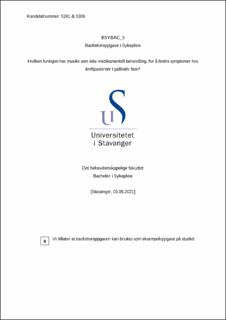| dc.contributor.advisor | Sørheim, Sissel Steinberg | |
| dc.contributor.author | Berntsen, Vilde Tvedt | |
| dc.contributor.author | Søvik, Sigrid Yung | |
| dc.date.accessioned | 2022-07-08T15:54:08Z | |
| dc.date.available | 2022-07-08T15:54:08Z | |
| dc.date.issued | 2022 | |
| dc.identifier | no.uis:inspera:110142954:47336259 | |
| dc.identifier.uri | https://hdl.handle.net/11250/3004097 | |
| dc.description.abstract | Bakgrunn:
Vi ønsker som nyutdannede sykepleiere å ha tilstrekkelig kunnskap om smertelindring til palliative kreftpasienter. Denne pasientgruppen har svært komplekse og sammensatte symptomer, hvor smerte er det mest fryktede symptomet. I praksis har vi lært om medikamentell smertelindring, men vi opplever et kunnskapshull rundt ikke-medikamentelle tiltak som musikk, og hvilken funksjon dette kan ha som symptomlindring.
Hensikt:
Hensikten med oppgaven er å belyse hvilken funksjon musikk kan ha som ikke-medikamentell behandling, for å lindre symptomer hos kreftpasienter i palliativ fase.
Metode:
Vi har brukt integrativ litteraturoversikt som metode i oppgaven. Videre har vi brukt metodetriangulering, hvor samtlige artikler er av kvantitativ data. I tillegg har to av artiklene også kvalitativ tilnærming. De valgte artiklene, sammen med våre personlige erfaringer og relevant litteratur, utgjør grunnlaget for oppgavens diskusjon og konklusjon.
Resultater:
Musikk som terapeutisk verktøy i kreftomsorgen, viser gjennom de valgte artiklene signifikant reduksjon av symptomer som smerte, angst og depresjon. Individualiserte tilnærminger kan være avgjørende for fullt utbytte av musikkens funksjon på symptomene. Sykepleiere har noe kunnskap om musikkens funksjon som symptomlindring, men trenger å øke denne kunnskapen og hvordan dette anvendes i praksis.
Nøkkelord:
Kreft, palliativ pleie, symptomlindring, ikke-medikamentelt tiltak, musikk | |
| dc.description.abstract | Background:
As newly graduated nurses, we want to have sufficient knowledge about pain relief for palliative cancer patients. This patient group has complex and compound symptoms, with pain being the most feared symptom. In practice, we have learned about pharmacological pain relief, but we experience a knowledge gap around non-pharmacological measures such as music, and what function this can have as symptom relief.
Purpose:
What purpose does music have as a non-pharmacological treatment, in symptom managment for cancer patients in palliative care?
Methods:
We have used an integrative literature review as a method in the task. Furthermore, we have used method triangulation, where all articles are of quantitative data. In addition, two of the articles also have a qualitative approach. The selected articles, together with our personal experiences and relevant literature, form the basis for the task's discussion and conclusion.
Results:
Music as a therapeutic tool in cancer care, shows through the selected articles a significant reduction of symptoms such as pain, anxiety and depression. Individualized approaches can be crucial to the full benefit of the music's function on the symptoms. Nurses have some knowledge of the function of music as a symptom relief, but need to increase this knowledge and how this is applied in practice.
Keywords:
Cancer, palliative care, symptom managment, non-pharmacological treatment, music | |
| dc.language | nob | |
| dc.publisher | uis | |
| dc.title | Hvilken funksjon har musikk som ikke-medikamentell behandling, for å lindre symptomer hos kreftpasienter i palliativ fase? | |
| dc.type | Bachelor thesis | |
